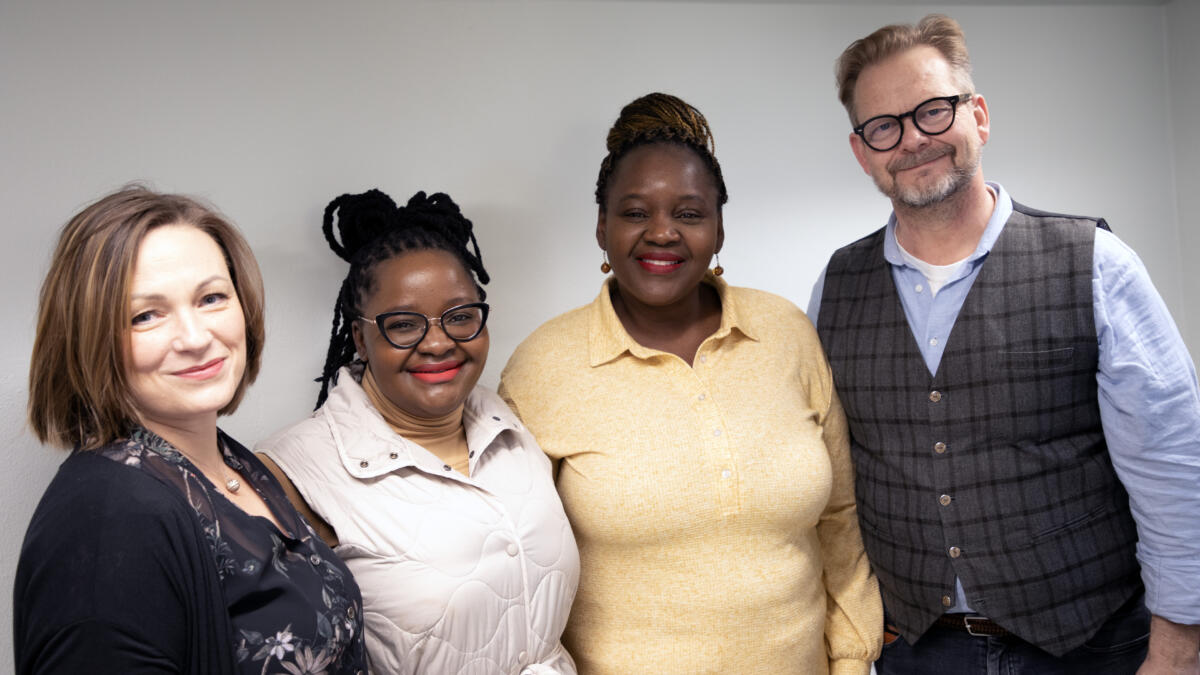Breaking barriers: South African scholars collaborate with Uniarts researchers on disability inclusion in arts education
In a bid to address issues of ableism and promote disability inclusion in higher education, a collaborative project between South African scholars and Uniarts Helsinki has emerged as a beacon of hope.

The project Health, wellbeing and disability narratives in the arts has centered on dismantling ableism as a structural system in society, particularly in higher education, and bringing about social change. The project’s research team has been composed of Associate Professor Dr Lieketseng Ned and Dr Chioma Ohajunwa from the Centre for Disability and Rehabilitation Studies at Stellenbosch University in South Africa, postdoctoral fellow Francisco Trento and Academic research fellow Tuulikki Laes and University Researcher Kai Lehikoinen at Uniarts Helsinki.
“The point is to find ways of challenging attitudes, cultures, and policies within the university: how can you think about creating an inclusive culture of learning? How can you change attitudes so that you have an environment that has a disability inclusive culture and people who carry inclusive attitudes with them? How do we enact policies that are responsive to all differences in the university, so that students and staff feel that they are accommodated and supported and that disability issues don’t appear as an afterthought?”, says Ned.
Exchange of knowledge and skills between disability studies and the arts
For Ned and Ohajunwa as disability and health study scholars, the cooperation opened a new angle, as they were not previously deeply engaged in arts education. In October 2023, the collaboration brought them to Helsinki to teach 31 Theatre Academy students on a “Critical disability studies” course for 31 Theatre Academy students interested in ableism in higher arts education.
In the course, Ned and Ohajunwa introduced critical disability studies and concepts related to ableism to the students. They shared their own experiences and gathered insights from the participants, resulting in lively and interactive discussions.
“The arts can offer powerful ways to address the issues of disability inclusion in higher education. Real-life stories and experiences can be transformed into productions that raise awareness and challenge people to think differently. Artists can facilitate accountability by demonstrating the real issues faced by disabled individuals and encouraging decision-makers to address these issues”, says Ohajunwa.
Looking to the future, Ned and Ohajunwa hope to challenge attitudes, cultures, and policies within universities. They emphasize the need for a disability-inclusive culture in higher education, where policies are responsive to all differences, ensuring that disability issues are not an afterthought but an integral part of the broader equality issues within the university.
“Arts have a unique ability to transcend regular knowledge and convey messages that touch the soul, making them an essential component in addressing disability inclusion and ableism in higher education. Art-based methods are valid ways of producing knowledge, expanding the methods used in research to generate more inclusive and comprehensive insights”, Ohajunwa explains.
An eye-opener to the existing practices to Uniarts
The collaboration has served as an example of how international cooperation can lead to transformative changes in the higher education landscape, fostering inclusivity and diversity in the arts and beyond.
Kai Lehikoinen emphasized the importance of establishing a dialogue and being informed about different perspectives and ways of thinking, which the South African scholars have brought to the project. He sees this collaboration as an opportunity to learn from different viewpoints and research conducted in Africa.
“I think the most important point is establishing a dialogue and being able to be informed and become aware of other positions and ways of thinking. Research being done in Africa provides us very different viewpoints. Hopefully when we are able to recognize the mechanisms of ableism in higher education, we can start to come up with ways to solve these problems and find ways to work that are more inclusive.”
Looking at the notion of disability from an arts education institution’s point of view
Tuulikki Laes highlights the project’s contribution to broadening the understanding of ableism. By examining it from a decolonial perspective, perspectives on accessibility and the broader issues of marginalization and intersectionality can be addressed and challenged. Ablesim is a broader question that relates to marginalization and different intersectional dynamics of how people can feel oppressed or marginalized or excluded.
“When we educate professional artists, musicians, dancers, actors, it’s all about very bodily issues. It’s based on the ideal of a normal able-bodied person – even of an elite “superior-to-normal” person. There is not much space of thinking and imagining what else can artistry and artistic practises be. Differently abled people, for example, bring new, positive understandings about skill and knowledge within arts.”
According to Laes, this also includes discussion about neurotypical or neuro-atypical people. In today’s discourse, these kinds of invisible disabilities are often overlooked, and when we organise education, we often take for granted the ablest perspective. For example, nowadays in higher education, collaborative learning is a keyword and there is lots of social engagement.
“There is a certain percentage of population who have difficulties with social engagement and that is not often discussed. The teachers are never asked whether they have neuroatypical or bodily disabilities or something that would need support in their everyday work. That is one of our ableist structures. It’s a thing that could be considered under occupational health, since some teachers might end up burning themselves out simply because these issues are not being taken into consideration. And we can also unconsciously transfer these mental mindsets to our students”, Laes highlights.
The collaboration has expanded the conversation also at Stellenbosch University, breaking down silos between different faculties. In addition to forming new networks and collaborations, the scholars have been engaging with the arts and performance departments, opening new dialogues and discussions.